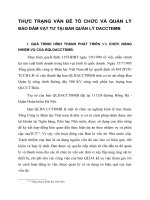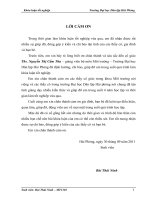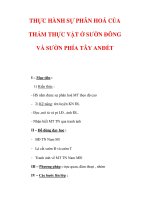QUẢN LÝ THẢM THỰC VẬT: SITE PREPARATION (LEC 11)
Bạn đang xem bản rút gọn của tài liệu. Xem và tải ngay bản đầy đủ của tài liệu tại đây (1.9 MB, 21 trang )
Site Preparation
The treatment of the soil and ground vegetation to prepare the soil surface as a favorable seedbed for
either naturally or artificially regeneration.
Seed disseminating
1
Site Preparation
Site preparation includes:
Controlling undesirable vegetation;
Improving soil structure, drainage and fertility;
Reducing logging slash
2
Purposes of Site Preparation
Reduce/eliminate competing vegetation
Remove competing vegetation from the site
3
Purposes of Site Preparation
Reducing logging slash to regeneration
Slash can impede regeneration both physically and biologically (insects, mammals,
pathogens)
4
Purposes of Site Preparation
Improve character of seedbed
•Organic Vs bare mineral soil seedbed
•Promote decomposition of surface organic
matter
•Improving the soil structure for regeneration
5
Methods of Site Preparation
Mechanical
Chemical
Burning
6
Mechanical treatments
Physical manipulation of site
Usually with large machinery
Preparing the site by hand is possible and economical only for relatively small-scale projects, where the labour of clearing the
competing vegetation and working the soil is not too time-consuming.
7
Mechanical treatments
Mechanical site preparation with heavy equipment can be divided into three categories:
1.
2.
3.
breaking or crushing vegetation in place
moving vegetation from the planting site
manipulating soil structure or microtopography of the site
8
Breaking Vegetation (Chopping)
A significant advantage of rolling choppers is that they do not displace the topsoil and they have a minimal effect
on soil runoff.
The most frequently-used tool used to crush existing vegetation in place is the rolling drum chopper
9
Moving Vegetation from the Planting Site (Shearing)
A more intensive treatment is the use of a shearing blade: a horizontal knife blade mounted on a large
crawler tractor which shears vegetation at the ground line.
Shearing can cause topsoil and
seedbed displacement
10
Manipulating the Soil
Disking
to break up or till the soil surface, improving soil aeration and moisture movement, and helping young trees to
root. Disking also incorporates organic surface layers into the underlying mineral soils and prepares the
surface for bedding where appropriate
11
Manipulating the Soil
Bedding
Bedding against the slope is essential to minimize soil erosion on upland sites
12
Manipulating the Soil
Ripping
Ripping encourages more deep root development than any other of the other soil treatment methods
13
Chemical treatments
Use of chemicals (Herbicide) to manipulate the site in preparation for regeneration
14
Chemical treatments
Chemical site preparation can be an effective method to temporarily control competing vegetation for plant
growth.
Chemical methods may involve simple equipment, can be less expensive, and provide longer control than
mechanical site preparation.
Chemical
effectiveness depends on the appropriate herbicide selection, the timing of application and
application rate.
15
Chemical treatments
16
Chemical treatments
Strip application
Spot application
17
Prescribed burning
Prescribed burning, or controlled ground fires, can be an effective and inexpensive means of removing or
reducing vegetation, and preparing a suitable seedbed in advance of planting or seeding.
18
Prescribed burning
Effective and safe use of prescribed fire requires:
Proper design of the fire breaks;
Personal protective equipment;
Careful evaluation of weather conditions on the day of
the burn, and training
19
Prescribed burning - Advantages
Relatively cost effective for large areas
Reduces slash, debris, litter, fuels and competing vegetation
Improve soil nutrient levels
Destroys pests/diseases
Induces sprouting
Melia azedarach ‘ seeds need to be treated by using fire before
disseminating
20
Prescribed Burning - Limitations
Must adhere to the burn permit laws
Damage to residual trees (depending on intensity and speed) – heated above 55C
Loss of nutrients (e.g. N) to atmosphere and
erosion
Air quality, visibility and smoke
Alteration of soil properties – degradation
Removal of organic material









